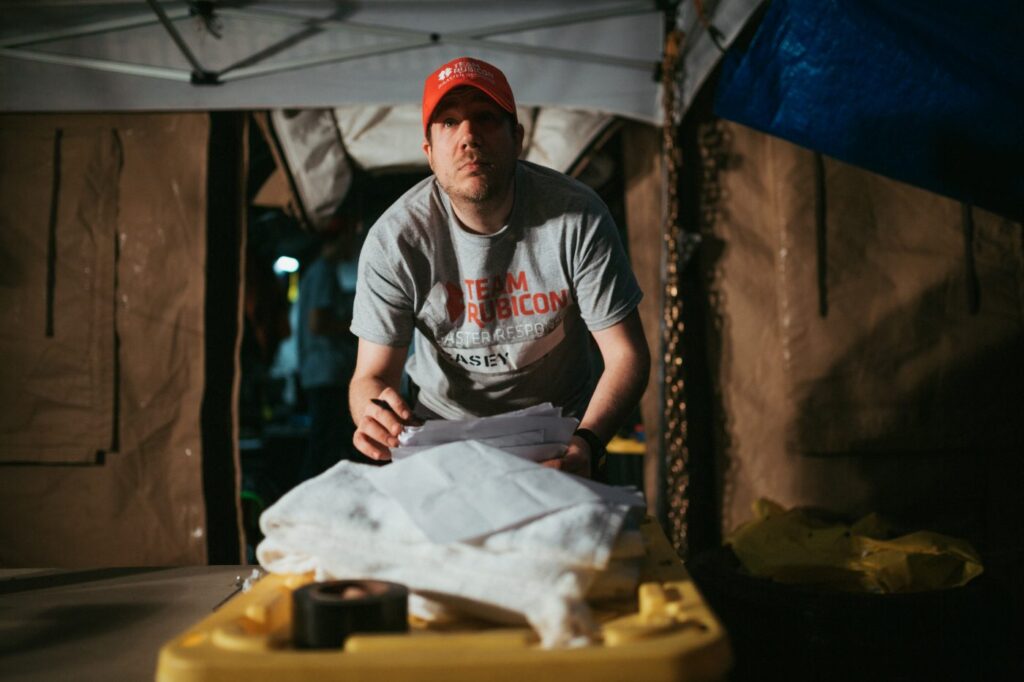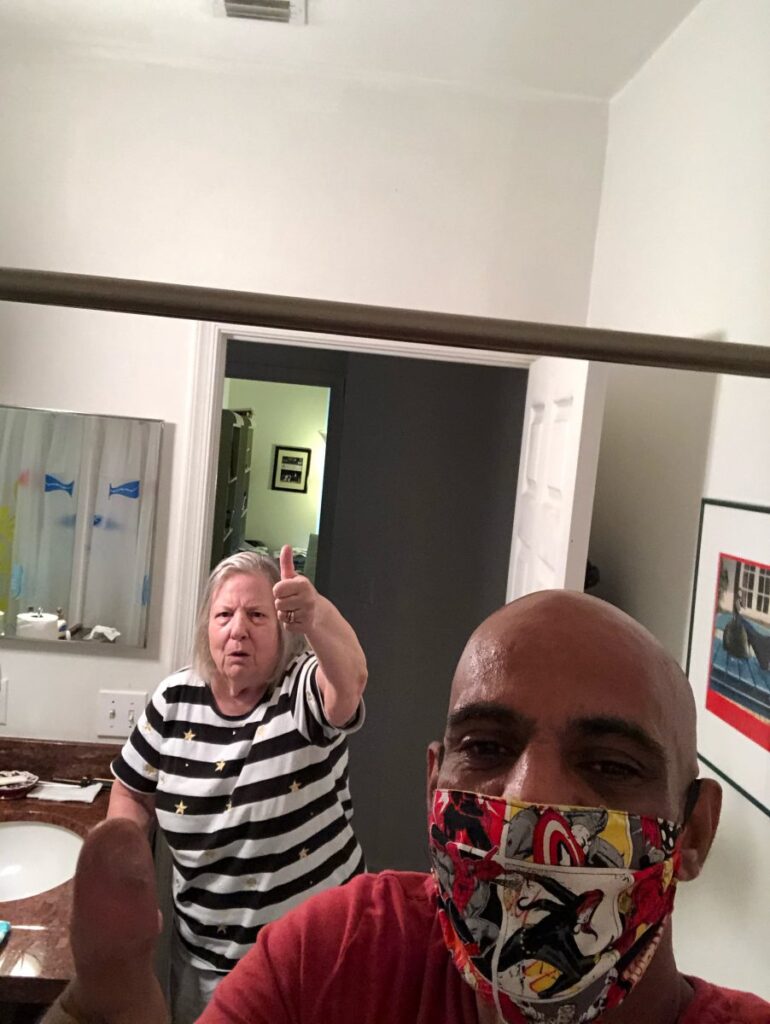When Casey Miller noticed his elderly neighbor struggling to climb a ladder to his roof, he was concerned. The Atlanta-based Greyshirt knew the man had some mobility issues that made climbing to any height potentially dangerous. “He normally walks with a cane,” Miller said, “so I was worried about him getting on that steep roof.”
Miller discovered that the neighbor’s plumbing exhaust pipe had been leaking water into his house. Since the man already had the materials on hand to make the repairs, and all of the work could be done outdoors without compromising anyone’s health and safety, Miller stepped in to help. Over the next two days, he got to work, replacing the old vent boot and applying spray rubber to close gaps. The repairs held up during the next rainstorm, and the neighbor was grateful to be spared more costly repairs to the interior of his house. Miller regarded the exchange as an ordinary part of being neighborly.
“I grew up in the South, and that’s one thing you just do. You help your neighbors as much as possible.”

Casey Miller
Miller was a newly enlisted electrician’s mate serving aboard a Navy submarine in Pearl Harbor when the 9/11 attacks occurred, and he recalls how the tragedy briefly united everyone. Now, as the country works to contain this new pandemic, he’s observing that same sense of unity. “After 9/11, everybody was able to come together and help everybody,” he said. “What we’re doing with neighbors helping neighbors is the same. There’s no need for us to be divided. We just come together and make sure that if there’s somebody in need, we take care of them.”
“IT’S MY TIME TO GIVE BACK”
With COVID-19 placing so many people at risk across the country, Team Rubicon volunteers are on a mission to serve their neighbors in any way they safely can, and that often includes home repairs.
Grady Grammer, a Greyshirt currently living in Southern California, echoed Miller’s sentiment and said he feels a duty to give back to the people who paid his salary for 22 years until he retired from the Navy as a senior chief boatswain’s mate. “They did right by me, so it’s my time to give back and do right by them,” he said.
When heavy rains recently flooded an elderly neighbor’s basement, Grammer knew that helping them pump out the space was just the right thing to do—especially since he happened to have the right equipment. “I had an electric submersible pump, which is all it took,” he said. “I just dropped it down into the space, plugged it in, and let it stay there a couple of hours to get it all cleaned out. They were just so happy that someone could help.”
Grammer got his start at Team Rubicon in 2017, responding to the Lilac Fires in northern San Diego County that destroyed 75 manufactured homes in the Rancho Montserate senior community. Grammer and other volunteers spent those days cutting up each house with metal saws and clearing the site of rubble. Occasionally, they would find keepsakes that they could reunite with their owners. With a degree in emergency management under his belt, Grammer has been eager to redeploy to the field but has embraced the neighbors helping neighbors initiative until it’s safe for him to do so again.
STAYING SAFE WHILE HELPING OUT
Considering the risks inherent in volunteering during a pandemic, many Team Rubicon volunteers have appreciated having clear guidelines for serving during this uncertain time. For Steve Narine, a Greyshirt from south Florida who first got involved with the organization to support Hurricane Dorian relief efforts in the Bahamas in late August 2019, the direction that came from Team Rubicon medical personnel was pivotal to his decision to remain involved during the pandemic.
“The people in the medical field have really stepped up and provided some top-notch information on what’s actually going on, and then they put together a plan of how to proceed if you want to get involved in your neighborhood,” he said. “We had a lot of information about how to take care of ourselves and others in order to participate in neighbors helping neighbors. Personal protective equipment and personal safety were priority number one. So, armed with that I said, ‘you know, I think I can swing this.’”
SNEAKING IN BUDDY CHECKS
Narine’s first opportunity to help a neighbor arrived in a somewhat unusual way, when an elderly woman in one of the condos that he manages called him for help with what she described as an “embarrassing” plumbing problem. Her toilet had clogged, and she reluctantly asked Narine for a plunger. Narine knew the woman personally and knew that she’d been having a difficult time since her husband had passed away the month before. He didn’t hesitate to step in.
“As I was knocking on the door she said, ‘Steve, it’s late and it’s Sunday. Don’t worry you can come tomorrow.’” But when he informed her that he was at the door, she was clearly relieved despite her embarrassment. “We social distanced, I danced with the commode, and we shared a laugh,” he said.

Narine and his neighbor manage to distance during repairs.
Now, Narine uses these kinds of maintenance calls as a way to perform occasional “buddy checks” with the woman, and to offer her a lifeline in what could otherwise be a very lonely and isolating time. For Narine, it has been gratifying.
“There’s a tremendous amount of gratitude and appreciation,” he said of his volunteer experiences, which also see him collecting surplus food from Florida farms and distributing it to the public for free, an initiative a number of Greyshirts have joined. “When we help with a disaster, we’re absolutely helping people on what’s the worst day of their lives. But, with COVID-19, there’s a lot of uncertainty out there. People are nervous. I tend to notice it in people’s voices.”
Narine believes the professionalism of the organization and its volunteers helps to project an air of calm in these stressful times. “When you’re able to come out and stay focused in an adverse situation, the response is always phenomenal.”
Greyshirts across the country are getting positive responses from their neighbors, and the gestures don’t always have to be grand. A roof might need fixing or a toilet may need unblocking. Sometimes, however, simply showing up for each other seems to be the greatest service of all—for recipient and provider.



